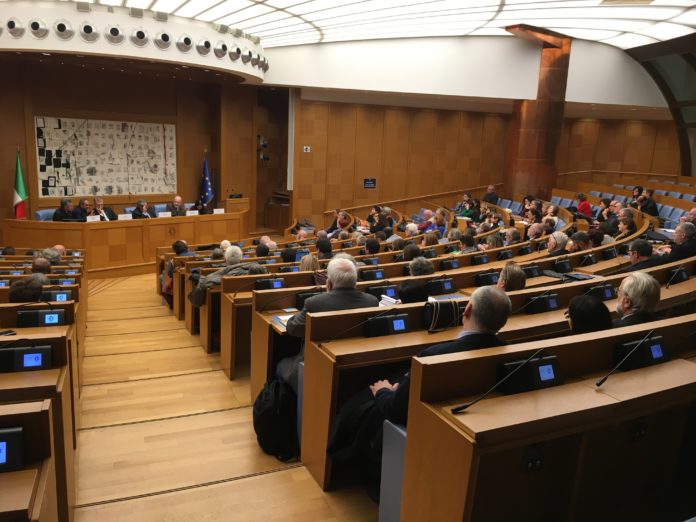
Rome, November 18, 2018 – “We must incessantly denounce injustice: this is the prophetic role of the churches, which unites an intense spirituality to the action for justice”. With these words pastor Luca Maria Negro, president of the Federation of Protestant Churches in Italy (FCEI), opened, last Friday November 16, the First FCEI’s Olenary Meeting, at the Waldensian church of Via IV Novembre, in Rome.
During the inaugural worship service, Negro commented upon the parable of the widow and the iniquitous judge (Luke 18) that has, at its centre, the perseverance in the request for justice and ends with a question: “However, when the Son of Man comes, will He find faith on the earth?”. “A disquieting and not at all theoretical question – said Negro – but not desperate because it invites us to reflect on the strategies of resilience of our small Italian evangelical churches”.
“A complex society deserves a cohesive, mutual and plural definition” said Paolo Naso, member of the FCEI Study commission, introducing the proceedings of the public event, which followed the worship service. The round table was entitled “For a Europe of solidarity and rights” and took place in the Hall of the Parliamentary Groups. “Today we are witnesses of policies that do not bet on integration but on a polarized and conflicting dis-integration. Our proposal is that of an ecumenical alliance for a new Europe and a responsible commitment to democracy”.
Pastor Olav Fykse Tveit, secretary general of the Ecumenical Council of Churches (CEC), focused on the ecumenical sense of the experience of humanitarian corridors: “We must look at Italy as a place in which, despite the numerical imbalance between the Catholic Church and the Protestant minorities, an extraordinary ecumenical practice was born to be taken as a model”.
Daniele Garrone, Protestant theologian, inviting the churches to a “wearing work on the front of culture and reflection”, underlined how the words “solidarity” and “rights” are “not charity, but fair, reasonable and useful” because these are the foundations of our democratic republics, born in the aftermath of the 20th century European tragedies.
Monsignor Marco Gnavi of the Community of St. Egidio, spoke of the emotional exasperation that hides other deep European problems: “We cannot afford ourselves the luxury of being pessimistic. The crisis can be an epiphany of other resources. Ours is an alphabet of reconciliation to build a multifaceted community “.
“There is a great hypocrisy on the issue of migration that questions the principle of solidarity we find both in the Italian Constitution and in the Gospel – said the European parliamentary Elly Schlein -. On the one hand, the law is asked for, on the other we do not work on policies that can permit the regular entry or re-placement of migrants. We must give Europe a social breath; only the Union is able to face the challenges that Italy alone could not fulfill”.
Giuliano Savina, director of the National Office of Ecumenism and Interreligious Dialogue (UNEDI) of the Italian Episcopal Conference (CEI) and Marco Impagliazzo, President of the Community of St.Egidio, brought a message of greetings and recalled the common commitment to ecumenical dialogue, reception, solidarity and rights.




























